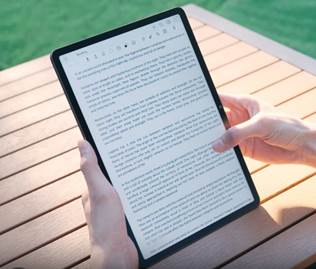Tablets have transformed how people
approach reading by combining traditional book benefits with modern technology
advantages. These devices have become the preferred reading choice for millions
because they address fundamental reading needs while adding significant value
through digital enhancements. The transition from paper to pixels represents
more than just format change—it's a complete reimagining of what reading can be
when supported by versatile technology that adapts to individual preferences and
reading habits across different contexts and content types.

Reading Comfort Advantages
Advanced Display Technology
Modern tablets feature specialized
display technology that replicates paper reading experiences while adding
digital advantages. Screens with adjustable color temperature and blue light
reduction capabilities ensure comfortable reading in various lighting
conditions. High-resolution displays render text with exceptional clarity,
while matte screen protectors eliminate glare and provide paper-like texture.
These features combine to create reading experiences that cause less eye strain
than traditional backlit devices, allowing for extended reading sessions
without discomfort. The ability to adjust brightness and contrast precisely
according to environmental conditions further enhances reading comfort in
different settings from bright outdoors to dim bedrooms.
Ergonomic Design Features
Tablets offer superior ergonomic
benefits for readers through lightweight designs and adjustable viewing
options. Their portable form factors enable comfortable reading in various
positions—lying down, sitting, or standing—without the physical strain associated
with heavy books or fixed-position reading devices. Adjustable stands and
protective cases allow perfect angle positioning for optimal reading comfort,
while one-handed holding capability provides freedom of movement during reading
sessions. The huawei 11.5 matepad demonstrates
how balanced weight distribution and slim profiles contribute to fatigue-free
extended reading, making tablets ideal for book lovers who value both comfort
and convenience in their reading experiences.

Content Access and Management
Vast Digital Library Access
Tablets provide instant access to
immense digital content libraries that far surpass physical book availability.
Readers can access millions of books, magazines, newspapers, and academic
papers through various apps and subscription services without space
limitations. Cloud synchronization ensures personal libraries remain accessible
across devices, while recommendation algorithms help discover new content based
on reading preferences. This instant availability eliminates waiting for
delivery or visiting physical stores, and built-in dictionaries and translation
tools break down language barriers, making global literature accessible to
readers everywhere in their preferred format and language.
Smart Content Organization
Digital reading on tablets
revolutionizes personal library management through intelligent organization
systems. Readers can categorize content by genre, author, reading progress, or
custom tags without physical space constraints. Advanced search capabilities
instantly locate specific passages or notes across entire libraries, while
reading statistics track progress and habits automatically. Collections can be
easily rearranged and updated, and automatic backup ensures valuable libraries
remain safe from physical damage or loss. This organizational flexibility
combined with virtually unlimited storage capacity makes maintaining and
enjoying personal libraries more convenient and personalized than ever before.
Enhanced Reading Experience
Customizable Reading Settings
Tablets offer unprecedented reading
customization that adapts to individual preferences and needs. Readers can
adjust font styles, sizes, spacing, and background colors to create perfect
reading conditions for their visual comfort and reading speed. Text-to-speech
functionality provides audio options for multitasking situations, while
dyslexia-friendly fonts and reading aids support diverse reading abilities.
These personalized settings remain consistent across all reading materials,
creating a uniform reading experience regardless of content source. The ability
to save and quickly switch between different reading profiles makes tablets
ideal for shared use among family members with different reading preferences
and requirements.
Interactive Reading Features
Digital reading on tablets enhances
comprehension and engagement through interactive features that traditional
books cannot offer. Instant dictionary lookups, Wikipedia integration, and web
search capabilities provide context without interrupting reading flow.
Highlighting and note-taking features capture thoughts digitally with
searchable organization, while social reading functions enable sharing passages
and discussing content with other readers. These interactive elements transform
reading from solitary activity to connected experience, enhancing both learning
and enjoyment through multimedia integration and community features that add
depth and dimension to the reading process across various genres and content
types.
Conclusion
Tablets have transformed reading by
blending traditional book qualities with digital innovations tailored to modern
needs. Their appeal lies in prioritizing experience, comfort, and accessibility
over mere content. Customizable features, instant library access, and
interactive tools have eliminated barriers to enjoyment, making reading more
comfortable, and more immersive while retaining the magic of storytelling.
Future advancements—like eye-friendly displays, longer battery life, and
smarter content discovery—will further enhance readability. This innovation
ensures tablets remain leaders in digital reading, continually improving how
people explore and savor written works while preserving the timeless joy of
losing oneself in a book.
